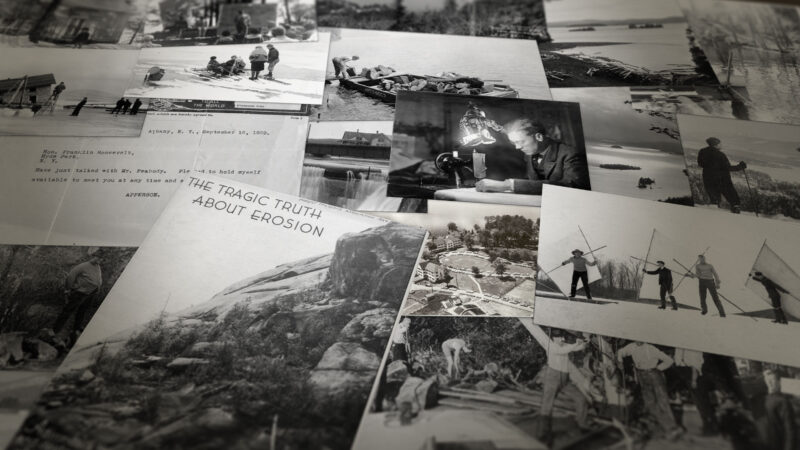- March 20, 1929 – JSA to Hilda Loines –
Dear Miss Loines:
Mr. Hopkins has reassured me again that the new filling-station and property on Sabbath Day Road, referred to in your letter of the 15th, was taken over by the State several months ago. He does not say how much more the property cost with the added improvements than it would have cost a year or more ago when we were urging his Department to proceed in a business-like manner and acquire the property before improvements were made.
You might be interested to know that I crossed the ice to the Narrows on Saturday, and Sunday morning spent several hours photographing trees that were cut on Turtle and Mohigan Islands by direction of Commissioner MacDonald. Most of the trees were dead, but nevertheless important for making soil. Some had been taken over to build a private boathouse for Mr. Chase, located about the center of Turtle Bay, just south of Langmuir’s camp on Tongue Mountain. This new structure is a serious obstacle to the natural environment and one word of discouragement from the Conservation Department and it would never have been built.
I looked up Andrew Smith and talked with him about Chester Dagles’ title to the Merrill land and he said he thought there was [not] any chance of Chester recovering any money spent in view of the poor title, but he would do the best he could in putting in the claims. Chester’s letter to you reflects bad influence of others. It seems a pity that he cannot be kept straight in respect to the valley as an agricultural possibility. I well remember my efforts to prevent the first park money being spent for the Alma Farm. My main interest was to preserve the wild beauty of the Narrows and I wanted the money spent on the east side of Tongue Mountain. I found Mr. Myers has some inside connections and was urging the State to buy his farm. I made a trip with him and Pettis up the valley and he insisted that the valley was unsuited for farming and that they had been losing money for several years and even Boas with improved machinery could not make the best farm in the valley pay, and referred to several other farmers who confirmed his point of view. I had the impression that the old time farmer who worked from sun-up until sun-down, and really worked, would probably make a success of his effort. Chester could hardly be put in that class, the general impression being that he is averse to farming. There is not a shadow of a doubt now that the valley would be full of soft drink stands, filling stations and commercial camps, had it not been for the extraordinary hard works property, and while there is no hope of keeping all the people associated with this valley in a happy state of mind while the State Custodian is constantly preaching against the State’s action, it seems at least humane to help them to get the right perspective as often as possible, and I hope you will try seriously to set Chester’s mind straight again. His mother received a good price for her land; in fact. Her own price, and he should be very happy over the outcome. Any other state of mind will not reflect benefit to him or his friends. Anything you can do that will help get a Conservation Commissioner who will handle matters of this kind without stirring up unnecessary feeling against the State, would see very desirable.
I am pleased that you will write to Mr. Green commending him for his stand against the Whiteface road, and hope you will not delay your letter.
With best regards,
Cordially yours,
JSApperson
